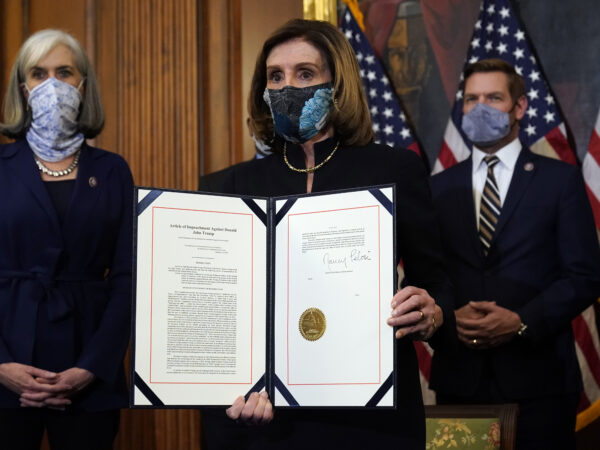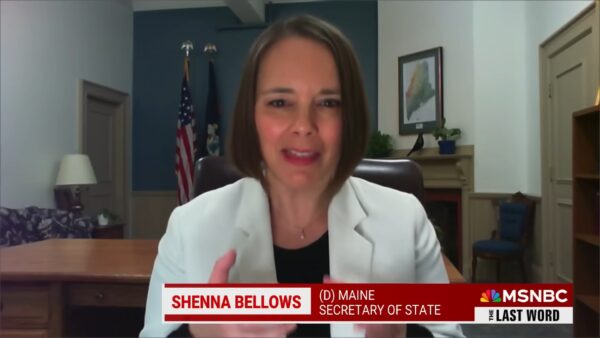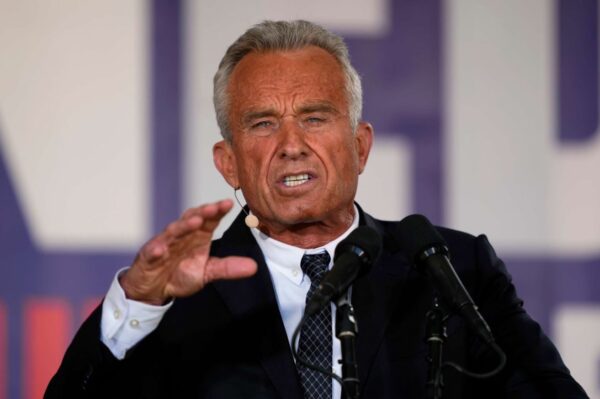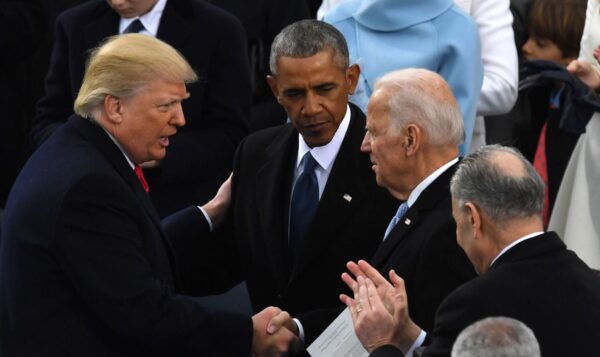Democrats’ abandonment of their namesake principle could spell disaster for our country.
Crowds of exuberant Hillary fans filled Manhattan’s Javits Center on election day, November 8, 2016. Forming outside was what seemed an endless line of supporters down 40th Street. It was going to be an early night of partying, followed by a week of celebrations for the country’s first female president, who would beat Donald Trump in a landslide.
The Huffington Post had given Hillary Clinton a 98% chance of winning the election.
In the evening after work, people across the country tuned in to see the election results. In Sacramento, Penny Dailey watched with joy to see the first woman elected as president. “It was close to what I felt to my son being born. It was that joyful,” she told The Guardian.
As 7:00 p.m. polls closed on the eastern seaboard and results started to trickle in, the much-needed Florida results proved a tighter race than expected. By 7:45, panic started to creep in. Feelings of hope and excitement at the Javits Center turned to feelings of dread, as the crowd turned quiet.
By 11:00 p.m. as the essential Rust Belt states tilted red, images of Hillary fans breaking down in tears began to broadcast on all the major networks. Trump was going to be the next president.
Election Integrity
Three years later, Clinton reflected on her loss to Trump. “He knows he’s an illegitimate president,” she said. “You can run the best campaign, you can even become the nominee, and you can have the election stolen from you.” Sounds like something Trump would say.

Indeed, both sides have been skeptical of unfavorable election results. But fortunately, both Clinton and Trump peacefully turned over power at the end of their terms — though some contend that Trump’s denialism was worse because he did not call to concede (an American tradition) and because of his involvement in the January 6 attack. Because of the “it’s different this time” argument, Democrats’ narrative is that election skepticism is purely a Republican problem, and they have mislabeled every skeptic an “election denier.”
In 2017 and through most of the Trump presidency, Democrats remained bewildered at the sudden and surprising loss of control. Was the loss their fault? No, they said. Trump won because of election interference from Russia. Thus began the modern worry about election integrity.
Since the 2020 election, which Donald Trump claimed was stolen through massive voter fraud, the question of election integrity turned into a flurry of state legislation hoping to restore trust in the system.
At the center of this was Georgia’s attempt to shore up voting by strengthening voter identification requirements and preventing outside groups from giving free food and water to voters waiting in line in order to solicit votes. The law codified, for the first time, the use of drop boxes, which became popular during the pandemic, but restricted their usage. Democrats decried that 2021 law, claiming that it discriminated against Black Georgians.
At the same time, the House Select Committee on the January 6 Attack tried to put front-and-center the claim that Trump and his allies attempted an “insurrection” to void the 2020 election results, in which Joe Biden won the presidency. Polling revealed that in spite of the Democrats’ efforts, only about a quarter of the population cared about the hearings. 78% of Democrats believed the committee was legitimate, while only 22% of Republicans and 37% of Independents agreed.
Since the 2022 midterm elections, media coverage of states’ new election laws and the January 6 attack have been quieter.
An Existential Threat
Trump’s 2016 upset seems to have caused Democrats to reconsider the meaning, and value of democracy itself. Somehow, on the one hand, democracy had failed them — but on the other, it was worth keeping — if it could prevent Trump’s demolition of the nation.
Mainstream media also began to see themselves in an outsized role in protecting democracy. Just one month after Trump’s inauguration in January, 2017, The Washington Post adopted the first slogan it had had in its 140-year history: “Democracy Dies in Darkness.” The “self-important” motto was widely panned by others as presumably anti-Trump. Trump had frequently been critical of WaPo as “the fake news media,” along with The New York Times and CNN.
The DC swamp establishment and their media hated Trump, and the media could not help but feed Trump’s unquenchable appetite for negative attention. Some have even argued that the media’s hatred for Trump (and endless coverage) was the thing that got him elected in the first place.
Trump’s term in office was tumultuous: not just by his personality, but by the establishment’s reaction to him. The term was marked by endless investigations and impeachments. Trump was, after all, an existential threat to democracy itself, they say. Thus, he should be removed by any means necessary.

“By any means necessary” is a dangerous principle making its way into today’s civil discourse, said pollster Frank Luntz last month. “I attend every rally I can on all sides of an issue,” he said. “I am able to listen to and learn from the speeches, the protests, on all sides of these issues. But the one that concerns me the most is the phrase, ‘by any means necessary.’” He noted the phrase lately has mostly been used by supporters of Hamas to justify violent acts against Israel.
“‘By any means possible’ is not a statement,” Luntz added; “it is a declaration of support for violent activity, and that’s where democracies break down. That’s where you undermine the whole purpose of being given the right to state your point of view and being given the benefit, the privilege, of living in a democracy.”
Stating that a figure, such as Trump, is an “existential threat,” artificially raises the stakes so high that it could be used as a pretext to step outside the law in order to save the law. It could be used to excuse violence — and that trend has been growing in recent years.
Another Round
During the first half of the Biden presidency, the media has watched Trump warily. Maybe all could be quiet and peaceful.
But that ended when Trump announced he would be running for office a third time in November, 2022. Since then, four criminal indictments have been filed against the former president: one from New York, one from DC, one from Florida, and one from Georgia. The threat of a second Trump term is hot on the minds of Democrats and they are hard at work to prevent it.

Because the Democratic Party doesn’t have anyone to run more popular than Joe Biden, they say, he is already the party’s nominee. The party has resisted even holding a primary to let democratic voters choose their party’s nominee. Any democratic candidate running against Biden has been met with stiff resistance, as Robert F. Kennedy Jr. found out. Last October, he was forced to run as an Independent.
Other democratic candidates have complained about the Democratic National Committee’s undemocratic treatment of their own primary, all in the name of preserving democracy.
“They [the DNC] are saying that because democracy is at risk, we must suppress democracy,” said Democratic candidate Marianne Williamson. “So, what they’re saying is that they in their infinite wisdom, which is actually their infinite arrogance and sense of entitlement, have the right to decide who is the best challenger to Donald Trump. Their claim of course is how dangerous it is if Donald Trump gets back into the White House. I don’t disagree with how dangerous it is if Trump gets back in the White House, my point is that, as Thomas Jefferson said, the only safe repository for power, (therefore decision-making authority) is the hands of the people.”
Williamson said that candidate suppression is the same as voter suppression. In spite of the DNC’s attempts to “invisibilize” her, she believes the claim that Biden is the candidate most likely to beat Trump is crumbling. This is apparent in polling data showing that in matchups, Biden loses to Trump and several other Republican candidates — especially in swing states.
“I do feel every day more and more people are waking up to what’s going on here,” Williamson told The Hill in December. “I’m very sad for our democracy if we continue to allow this situation where Democrats are like lemmings running to the sea … This trance — it’s almost like some Democrats are in this codependent trance — ‘the DNC says we’re running Joe’,” they say.
Pausing Democracy
Trump’s rise and Biden’s fall in the polls through the last quarter of 2023 have alarmed the Democratic Party, increasing the stakes and also the limits to which the party must go in order to stop Trump. MSNBC media personality Joe Scarborough voiced the concerns of many liberals, saying in December that “If [Trump] is voted into office, … he will get away with, he will imprison, he will execute whoever he’s allowed to imprison, execute, drive from the country.”
The media’s hair-on-fire hysteria is now being used as a pretext to use unlawful means to beat Trump. With polls indicating that Americans are likely to choose the wrong candidate in 2024, some feel it is necessary to keep Trump off the ballot altogether.
Libertarian Robby Soave, editor of Reason Magazine, observed, “Recall that for years, … we have heard warnings from Democratic officials, from the mainstream media … everyone else who forms the expert class, that Trump represents an existential threat to Democracy,” he said. “The unique danger posed by a second Trump term in office, were Trump to return to the White House in 2024, meant that the rules were going out the window. His opponents are determined to stop him at almost any cost.”
Throughout the country during 2023, liberal groups have been suing states to prevent Trump from being listed on ballots. On December 19, The Colorado Supreme Court ruled that Trump cannot run for president in that state, citing a constitutional insurrection clause. Critics of the decision say it is completely flawed, and the ruling will almost certainly end up before the conservative U.S. Supreme Court.
Reacting to the news, journalist Glen Greenwald wrote on X, “As Biden collapses in the polls, and Trump rises, Democrats are going to resort to increasingly desperate — and anti-democratic — means to ensure Trump can’t run, all while they insist that only they are the Guardians of Democracy.”
As Biden collapses in the polls, and Trump rises, Democrats are going to resort to increasingly desperate — and anti-democratic — means to ensure Trump can't run, all while they insist that only they are the Guardians of Democracy.
— Glenn Greenwald (@ggreenwald) December 20, 2023
This is playing with real fire: https://t.co/UFdoju77UW
After Christmas, the Maine Secretary of State followed suit and banned Trump from that state’s ballot, citing the 14 Amendment’s insurrection clause. Maine’s Superior Court will now need to rule on the matter by January 17.
Robby Soave questioned whether such a threat as Trump justified breaking the rules of democracy. “Are his opponents saying, we can’t beat Trump, so it’s ok to cheat? What does that do to their argument that it is Trump who won’t play by the rules of Democracy — when they have gone to the court to beg the justice system to take this choice off the table for the American voters — who I suppose are too stupid to decide for themselves, and Trump is the threat to Democracy?”

“If those who oppose Trump — especially those in positions of power in the media and the government — decide that it’s permissible to lie, obfuscate, disseminate misinformation, quash legitimate news favorable or helpful to Trump, and do whatever else is necessary to keep him out of office, regardless of ethical or democratic considerations, then they will have committed a greater crime than anything you could lay at Trump’s feet,” wrote Brown University economist Glenn Loury.
“If they act to subvert the democratic process in order to secure the outcome they prefer over that preferred by the electorate,” Loury continued, “they will wake up one morning to find that the democracy they claim to value so highly will have disintegrated.”
The Democrats’ insistence that the end justifies the means could spell trouble — not just to their own narrative that they are the “Guardians of Democracy,” but also spell disaster to a democracy that has already had its elections called into question by both sides. And as a tactical error, Democrats just told Colorado Republicans that they can’t vote for who they want, and the whole nation heard it.
“If Trump is kept out of office through judicial fiat rather than being defeated in a fair election, his supporters will never accept the result. This country will become ungovernable,” Robert F. Kennedy Jr. wrote on X in December.
If Trump is kept out of office through judicial fiat rather than being defeated in a fair election, his supporters will never accept the result. This country will become ungovernable.
— Robert F. Kennedy Jr (@RobertKennedyJr) December 20, 2023

Such a pause in democracy will set a terrible precedent that will be nearly impossible to unwind. We hold to our principles when times are easy. But if we don’t hold fast to a principle — like democracy — when times are hard, then we don’t actually believe in that principle. If you say you have faith in democracy, then believe it both when the sun shines, and when it does not.
A Warning to Conservatives
It is not fair that Democrats, who are so clever at name-calling, should label Republicans as “election deniers.” No one even knows what that means, or who it actually applies to.
Republicans set themselves up for this though. At the end of the 2020 election when Trump lost to Biden, we had serious questions about election integrity. Unfortunately, too many got caught up in the temptation to follow their crowd in making blind statements about widespread election fraud, stating it as fact when the evidence just wasn’t there.
You know, maybe there was widespread fraud. But without the evidence, you cannot yet draw that conclusion.
I urge conservatives to learn from the worst. You don’t like Hillary? Go ahead and learn from her — and don’t do what she did. Don’t make the claim unless you have the evidence to back you. You should also remember this moment — now, when you happen to be on the right side of protecting democracy while Democrats consider overriding it. Soon, you may also be as politically desperate as they are, and unlike them, you will need to follow your principles. Their abandonment of their principles is no excuse for you!
Conservatives also need to change how they talk about election integrity, and about 2020 specifically. It is good to be skeptical. Skepticism is not denialism. What is the difference? Skepticism says, “I’m not sure I trust this, but I don’t know for sure.” Denialism says, “I know it was fraud, I know it.”
Ironically, skepticism is a stronger argument (saying you don’t know) than making absolute statements that you think you know. Why? Because you can never be wrong voicing your skepticism, and no one can challenge you on it. Skepticism presents as a question rather than as a conclusion. Skepticism seeks for the truth.
Election integrity is essential in a democracy. Honest skepticism will make elections more transparent, and root out real fraud. But be careful to not dismiss the entire process as rigged or irredeemable. You are an election skeptic, not an election denier. Hold fast to your principles. Hold fast to democracy.
– by AJ Martel
Feature image caption: Dread sweeps over Hillary Clinton fans at her 2016 election night party in New York in a night democracy had delivered an extraordinary surprise: Donald Trump was winning the presidency. Courtesy of The Guardian/Andrew Gombert.

Read more in Progressive Organizations Implode by BE Davis.
AJ Martel – Escalante
AJ Martel is the youth coordinator at The Byway, but he is involved in most everything. He and his family live in Escalante, and they love it here! AJ has found Utah’s small towns quite inviting and under-defended, which is why he’s so involved with the paper. What AJ loves to do most, though, is serve his community. That is clear through everything he writes and does for Escalante, Utah.

